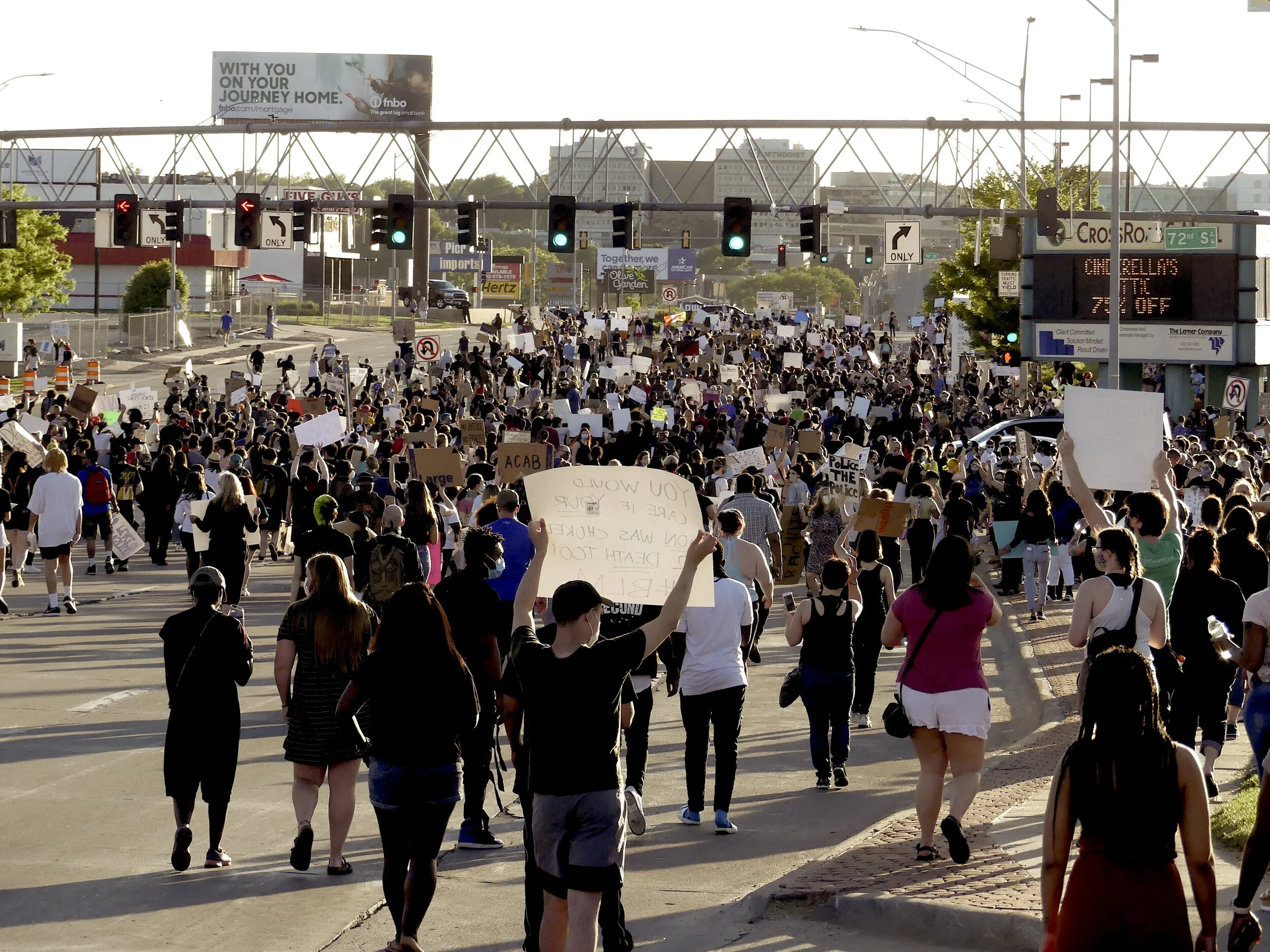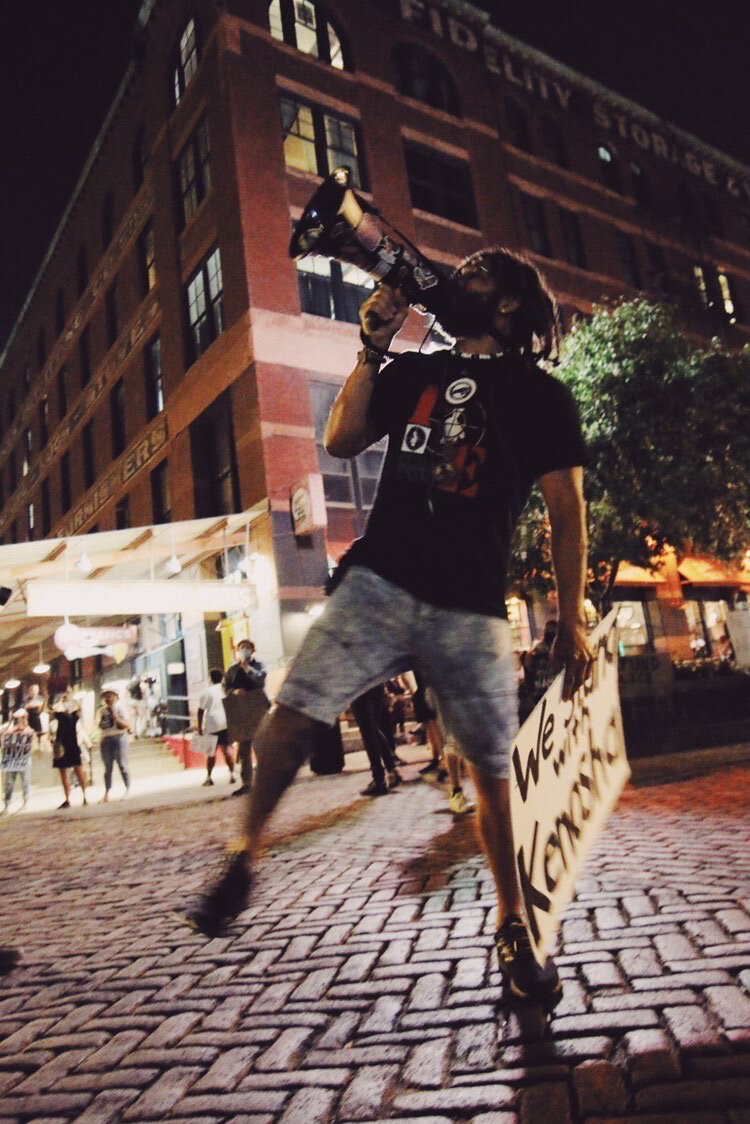Civil Rights Lawsuit Settlement Promises Shifts in Police Policy and City Ordinances
Protestors marching in Omaha in May for Black Lives , and more accountability from law enforcement in May 2020 . Image Credit: Andrew Washington
By Emily Chen-Newton
A settlement agreement has been reached in the federal civil rights lawsuit against the City of Omaha, Police Chief Schmaderer, and Captain Matuza. Plaintiffs in the case now bringing significant change to OPD’s policies, include Black Lives Matter protestors, an independent journalist, and a law student acting as a legal observer, all of whom were detained in a mass arrest of over 120 people during a nonviolent protest last summer.
The summer of 2020 ushered a racial reckoning into Omaha and other U.S. cities that many say is long overdue. But the protests in the name of Black lives were met by extreme police force nationwide, and Omaha was no exception in their use of force on primarily peaceful protestors. Under this agreement, OPD must adopt tighter restrictions on their use of chemical irritants and produce an annual report outlining: what kind of chemicals were used, how much, when the chemicals were deployed, and any injuries that were caused by the deployment.
Importantly, the settlement also requires the rewriting of the city ordinances used to arrest the over 120 peaceful protestors in mass last summer. The vagueness of Omaha City Ordinances 20-44 and 20-45 were targeted by the protestors represented by the ACLU when this civil lawsuit was originally filed last October.
After protestors demanding better police accountability were met with pepper balls and batons, this settlement delivers a requirement that all officers provide their badge number when asked by protestors or members of the press. Mel Buer, a journalist detained in the mass arrest and a plaintiff in the civil rights case says, “It’s very difficult sometimes when you are standing at a police line and you’ve got cops who are you know, 20 feet away from you and it’s dark outside, you may not be able to read the nameplate. But now, they have to respond to us. They can’t obscure their identity in the course of their duties if they have their uniform on.”
Creighton Law student, Riley Wilson, was acting as a legal observer the night he was arrested along with the others after Omaha Police used their vehicles to barricade either end of a highway overpass the protestors were crossing. Riley points out that, “All of us on this lawsuit had the opportunity to sue for money, and we forwent that. You know, part of this negotiation, this settlement, was dropping any other suit. And we were happy to not accept any money if it meant we were gonna get some protections for protestors in return, that might prevent what happened to us happening to others in the future.”
A key element of this settlement’s enforceability is that it allows for a consent decree, a powerful tool enforceable in federal court under federal law. A consent decree is a federal order. So as Adam Sipple, Legal Director of Nebraska’s ACLU, explains, “If there are violations of the agreement going forward, we don’t have to count on the internal affairs department of the Omaha Police Department to hold people accountable.” Instead, Sipple said the infraction would go directly to a federal judge.
Bear Alexander, an organizer with Omaha’s Progressive Black Led Ally Coalition (ProBLAC), also points out the importance of the consent decree. Bear says it’s critical that if any of the requirements in the agreement are violated by OPD, “We have the right to take them to court...federal court to hold them to their word.” This is, however, far from the end of advocacy for Bear and others in ProBLAC especially when it comes to the issue of police accountability. The settlement states that the plaintiffs, including Bear, Mel Buer, and Riley Wilson consent that, “This Agreement should not be construed, in any way, as an admission that any conduct of the city or its agents, including Chief Schmaderer or Captain Mark Matuza, violated any constitutional provision or was otherwise contrary to law.” Regarding the Chief, Captain Matuza, and the city admitting no wrongdoing, Bear Alexander references a quote from Malcolm X,
“If you stick a knife in my back nine inches and pull it out six inches, there’s no progress. If you pull it all the way out, that’s not progress. Progress is healing the wound that the blow made. And they haven’t even pulled the knife out, much less healed the wound. They won’t even admit the knife is there.”
Alexander questions how the Omaha Police Department can move forward to “build bridges'' with the community, “without any admission of guilt, how can there be any sort of accountability whatsoever? When Malcolm X said progress...progress is pulling the knife completely out of the back...healing the wound. And you haven't even recognized there is a knife in my back yet.” But after months of protestors, advocacy groups, and even state senators calling for police reform with little policy change, this settlement does bring some of the most significant shifts in the Omaha Police Department’s crowd control, chemical agent, and transparency policies born out of the summer of 2020.
The settlement was approved and adopted by United States District Judge Joseph Bataillon on January 8th. A joint press release was issued including sentiments from Adam Sipple, Legal Director at the ACLU of Nebraska, and Omaha Police Chief Schmaderer. Both Sipple and Schamderer remarked on the work put into the agreement by all involved. “I want to thank the legal teams, from both sides, for their dedicated work,” noted Omaha Police Chief Todd Schmaderer. And Adam Sipple concluded, “From the start, our plaintiffs’ goals were to defend their rights and protect future protests. This agreement achieves meaningful progress on both fronts.”




